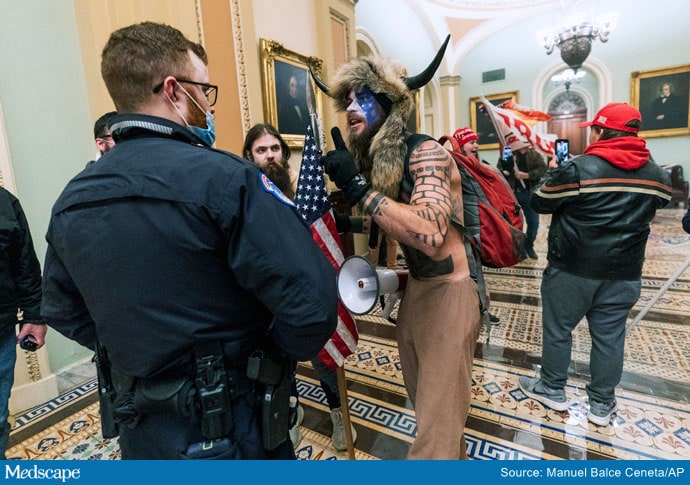Believing in Conspiracy Theories Is Not Delusional

Dr Ronald Pies
When many people across the country, not to mention in public office, believe that the world is run by a group of Satanic pedophiles that includes top Democrats and Hollywood elites, and that former President Trump is leading a secret mission to bring these evildoers to justice, one can’t help but ask if they’re at least to some degree mentally impaired.

Dr Joseph Pierre
Conspiracy theories are often received with psychiatric connotations; associated with paranoid plan-hatchers, and nonbelieving outsiders. But whereas theories such as QAnon strain credibility for many people, we would argue that they are likely not the product of psychosis or mental illness; nor do conspiracy theories in general represent delusions.
For one thing, surveys have consistently revealed that about 50% of the population believes in at least one conspiracy theory. Furthermore, as we illustrate in Table 1, there are several substantive differences between conspiracy theory beliefs and delusions.
Some researchers consider conspiracy theories to be “a subset of false beliefs,” but most scholars, ourselves included, do not prejudge their validity or veracity. Real-life conspiracies, such as the CIA’s MK-Ultra program, have clearly occurred throughout history.
Our central contention is that belief in conspiracy theories is distinct from psychosis, and more closely resembles extreme but subculturally sanctioned religious or political beliefs. However, the line between believing in conspiracies and being delusional becomes blurred when the believer becomes part of the conspiracy theory and feels compelled to act on the belief as part of a personal mission.
Take Edgar Maddison Welch, a 28-year-old man who firmly believed the so-called “Pizzagate” conspiracy theory — the baseless claim that Hillary Clinton and Democratic elites were running a child sex-trafficking ring out of a Washington, DC pizzeria. Seeing himself a potential savior of children, Welch drove 350 miles to the pizza shop from his home in North Carolina in December 2016 and fired three shots from an AR-15 style rifle into a locked closet door, ultimately surrendering to police. However, on questioning he quickly conceded, “The intel on this wasn’t 100%.”
Who Believes in Conspiracy Theories?
Given that half the population believes in at least one conspiracy theory, it should come as little surprise that there is no reliable “profile” for believers. Although some studies have suggested associations with low education; right-wing political orientation; and certain personality traits like subclinical paranoia and schizotypy, such findings have been inconsistent and may vary across specific conspiracy theory. Associations between conspiracy belief and paranoia suggest overlap within a “conspiratorial mindset,” with recent evidence that “distrust of officialdom” is a key mediator between believing in conspiracies and political ideology.
Other quantitative “cognitive quirks” reported in those who believe in conspiracies are a need for certainty and control; a need for uniqueness; illusory pattern perception; and lack of analytical thinking. It’s unclear which of these factors may represent universal cognitive explanations for conspiratorial beliefs, vs those that might be related to specific beliefs, such as the need for certainty during times of crisis and societal upheaval, when conspiracy theories tend to flourish.

Protester Jake Angeli inside the US Capitol on January 6.
Much of the research on conspiracy theory belief is based on the questionable premise that it’s best understood at the level of the individual’s psychopathology, or the “deficit model,” as it’s called. One of us (JMP) has instead proposed a two-component model that includes social and informational contexts. The first component — epistemic mistrust — involves mistrusting conventional, “authoritative” knowledge. The second involves biased information processing and exposure to misinformation, often transmitted by word of mouth, or through social networks. Using this model, believing in conspiracy theories could be conceived as involving “delusion-like beliefs,” but not frank psychosis or full-blown delusions, as one might see, for example, in schizophrenia.
Indeed, many of the cognitive characteristics associated with conspiracy theory belief are universal, continuously distributed traits, varying in quantity, rather than all-or-none variables or distinct symptoms of mental illness.
Table 1. Substantive differences between conspiracy theories and delusions.
Source: Pies R, Pierre J, 2021
| Conspiracy Theories | Delusions | |
|---|---|---|
| Correspondence to “reality” | Usually conspiracy theories are false, but occasionally prove to be true | By definition, delusions are false beliefs |
| Endogenous vs Exogenous | Origin lies mostly in externally provided information, news, social media, etc | Usually arise “from within,” based on idiosyncratic response to external and/or internal stimuli; often a component of a disease process |
| Degree of “sharedness” or communality | Marked; often linked with community of like-minded individuals | Sharing is generally not possible; delusions are too self-referential, personalized |
| Information processing | Biased, with respect to the content of the conspiracy | Markedly aberrant with respect to the content of the delusion |
| Epistemic mistrust | Often pervasive mistrust of authority, “experts,” science, government, etc. | Mistrust usually more localized around a specific, core delusion; identified individual; or group |
| Hallucinations | Probably rare but little high-quality research on this | Common, especially in schizophrenia (eg, command auditory hallucinations) |
| Level of social-vocational impairment | Often minimal but may be present | Often significant, especially in schizophrenia |
Essentially, delusions are fixed, false, usually unshared beliefs, often based on subjective “inner” experience.” (One rare exception is the so-called folie à deux, in which two people appear to “share” the same delusion; however, psychiatrists have long debated whether both individuals should be considered truly delusional). The delusion’s content is often “self-referential”; ie, focused primarily on the believer.
In contrast, conspiracy theories are usually, but not necessarily, false. They are typically shared beliefs that don’t explicitly or directly involve the believer, and are based on evidence that one finds “out there,” such as on the internet. This speaks to the highly communal nature of so many conspiracy theories — networks of like-minded individuals reinforcing one another’s beliefs in a particular socio-cultural context.
Conspiracy Theory Belief, COVID-19, and Medical Intervention
As for medical conspiracy theories, none have flourished recently more so than those involving the COVID-19 pandemic. As a recent editorial by Stein et al noted,
“Some conspiratorial claims include assertions that COVID‐19 is a hoax; arguments that the virus was created artificially and spread on purpose as a bio-weapon; or allegations that governments are using the emergency situation to pursue their anti-democratic goals. …Other conspiracies argued that people in power are taking advantage of the pandemic as a plan to inject microchip quantum-dot spy software and monitor people.”
Stein and colleagues make the important point that “A key difference between COVID‐19 and the 1918 flu pandemic…is that [now] a highly interconnected world, to a great extent on social media, is setting the stage for distributing information and misinformation about COVID‐19.”
Consider the following composite vignette:
Mr. A is a 70 y.o. retiree with a history of COPD who has been advised by his PCP to get vaccinated against COVID-19. He is extremely reluctant to do so, fearing that “the vaccine is going to change my DNA” and “might even give me COVID.” He has heard from friends on social media that vaccine developers “faked the results” and are “in cahoots with the federal government.” Mr. A has heard “experts” declare the vaccines safe, but does not trust them. Mr. A has no psychiatric or substance abuse history, and there are no cognitive, perceptual, or other abnormalities in Mr. A’s mental status exam.
Mr. A’s beliefs qualify as a “conspiracy theory,” but probably represent widely held misconceptions about COVID-19 vaccines, as well as widespread mistrust of pharmaceutical companies and the federal government. Based on the information provided, there is no basis for concluding that Mr. A is psychotic or delusional. His beliefs appear to be the result of “epistemic mistrust” of authoritative informational accounts, biased information processing, and exposure to misinformation.
How should the physician manage and care for patients like Mr. A? Absent frank delusions, there is no role for antipsychotic medication, though for extremely anxious patients, a time-limited course of an anti-anxiety agent may sometimes be warranted. In addition to providing accurate medical information to the patient, the physician should avoid arguing, or trying to “talk the patient out of” his or her belief. Instead, the focus should be on sustaining and strengthening the physician–patient alliance; establishing an atmosphere of respect and safety; clarifying differences in trusted sources of medical information; and allowing the patient time to process the physician’s recommendations.
One-to-one engagement with healthcare providers has proved effective in reducing vaccine hesitancy and correcting misinformation. For patients with less fixed conspiracy theory beliefs, it may sometimes be helpful to gently offer alternative hypotheses to the patient’s conspiracy theory, using elements of cognitive-behavioral therapy (CBT). For example, a physician might ask, “Is it possible that the online source you read was mistaken about the vaccine changing your DNA?” while reminding patients that — contrary to popular belief — mRNA vaccines have been in development against cancer for several decades.
Challenging beliefs collaboratively and acknowledging areas of uncertainty, rather than confronting or arguing about false beliefs, can foster trust between physician and patient and, at the very least, open a dialogue regarding potential exposure to medical misinformation. “Inoculation” strategies that present and then dispel misinformation before patients become aware of it are among the best supported strategies for mitigating conspiracy theory belief. Ideally, physicians and healthcare systems should maintain an ongoing “inventory” of medical misinformation circulating online and “beat it to the punch” with reliable information.
Finally, because believing in conspiracy theories is often associated with a sense of uncertainty, and feeling that one’s life is “out of control,” medical interventions can be framed as ways of regaining control and appealing to patients’ values; for example, saying, “By getting the vaccine, you’ll be more likely to stay in good health, protect your family, and do all the things you want to do.”
Ronald W. Pies is a professor of psychiatry and lecturer on Bioethics & Humanities at SUNY Upstate Medical University in Syracuse, New York.
Joseph Pierre, MD, is a health sciences clinical professor in the Department of Psychiatry and Biobehavioral Sciences at David Geffen School of Medicine at UCLA.
For more news, follow Medscape on Facebook, Twitter, Instagram, and YouTube.
*** This article has been archived for your research. The original version from Medscape can be found here ***


